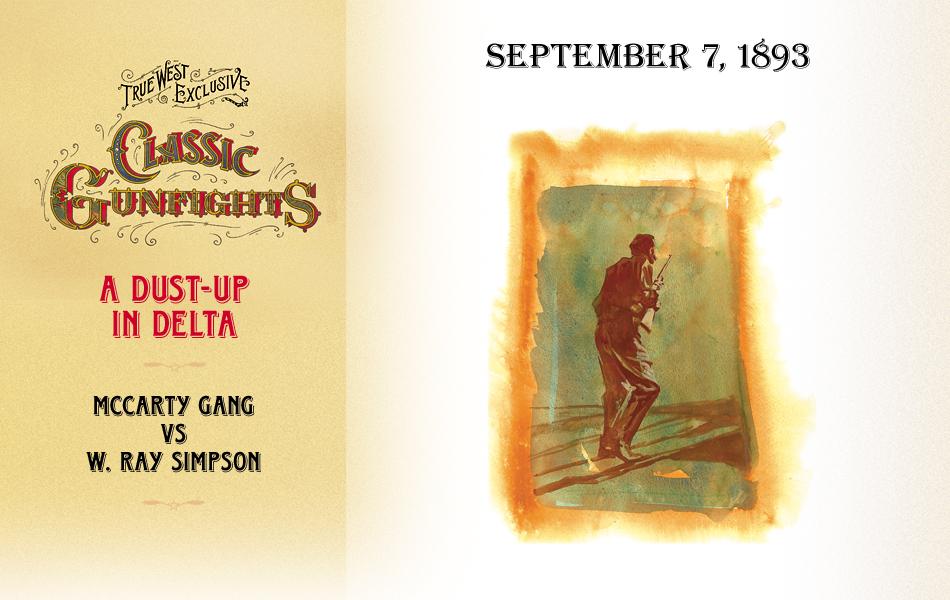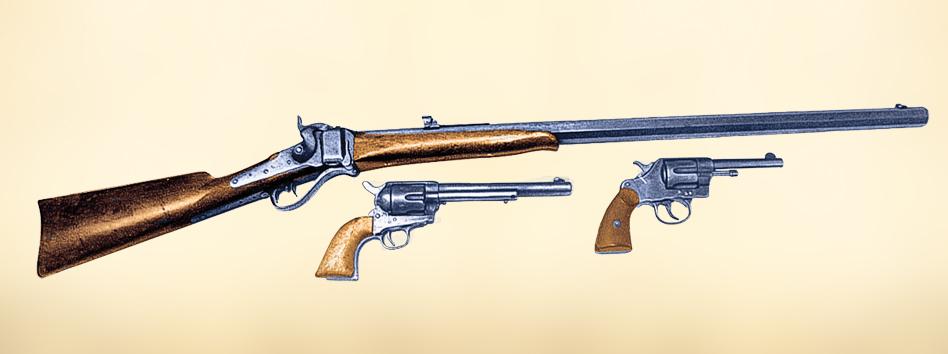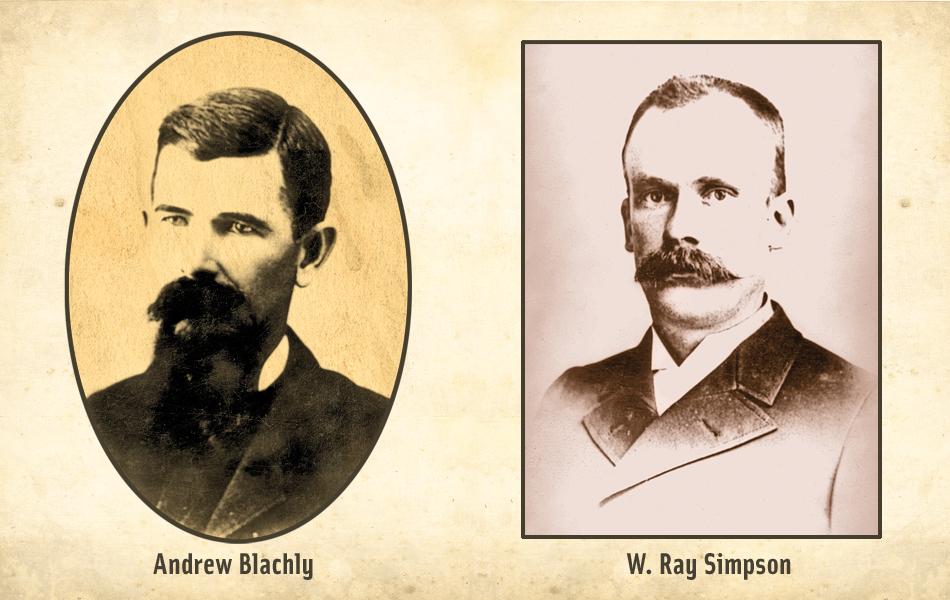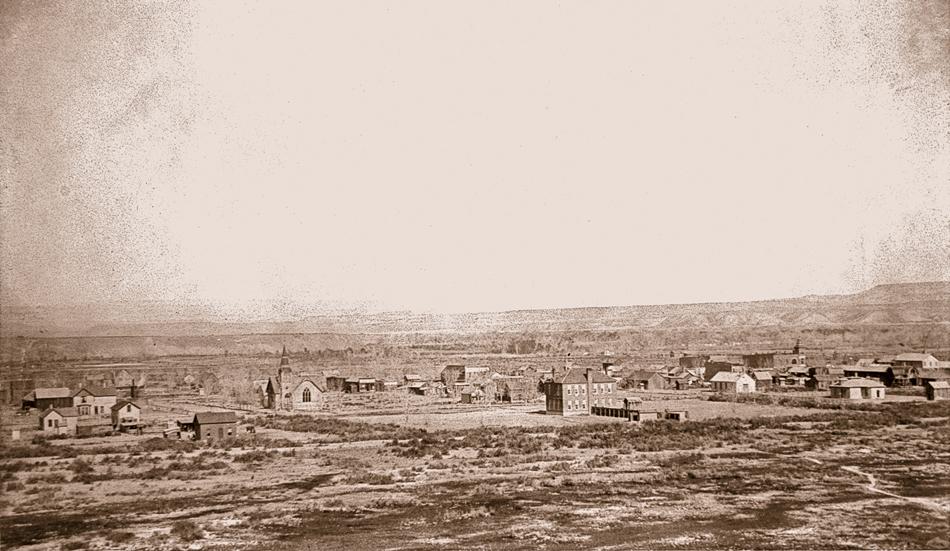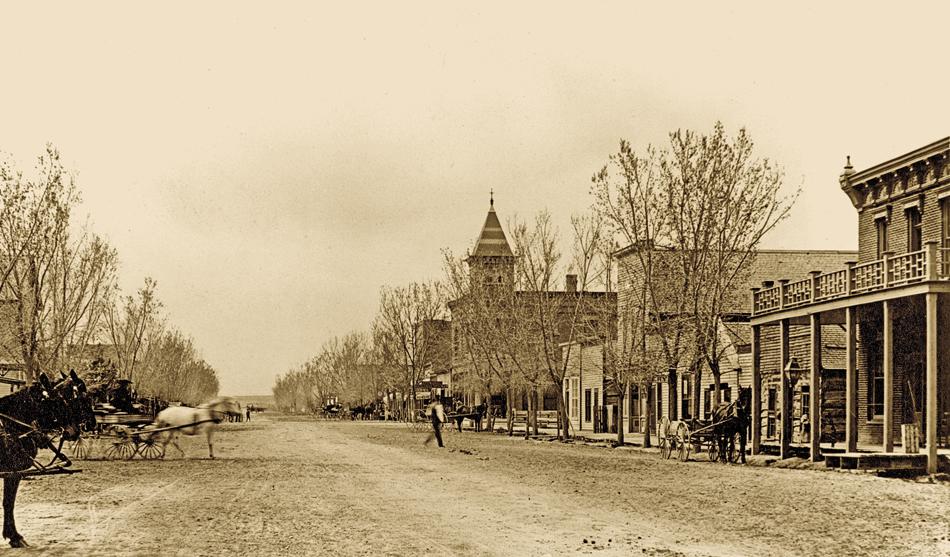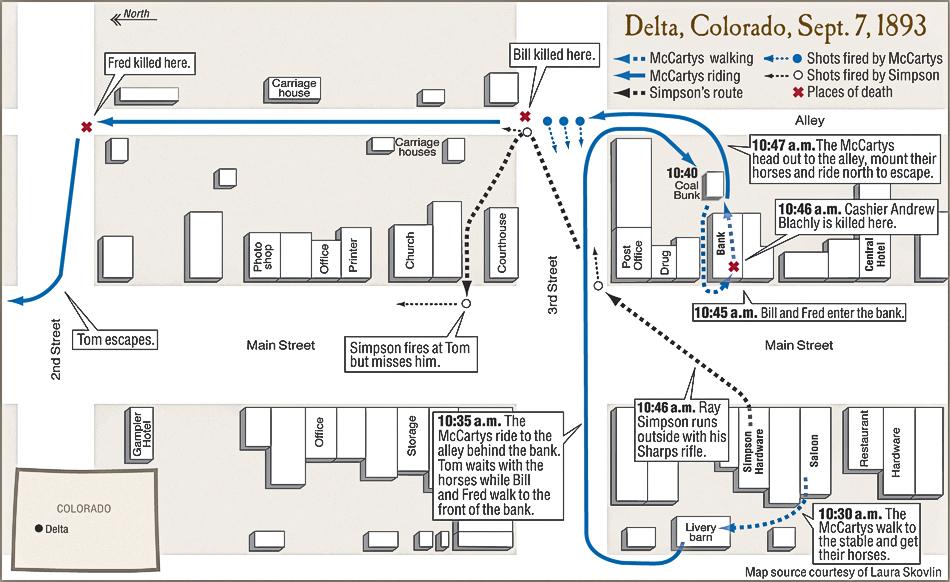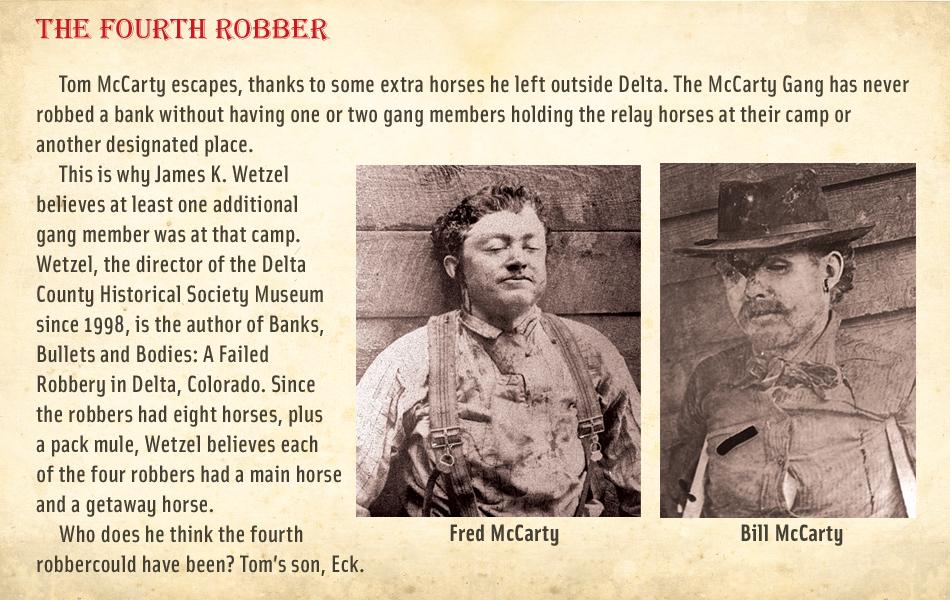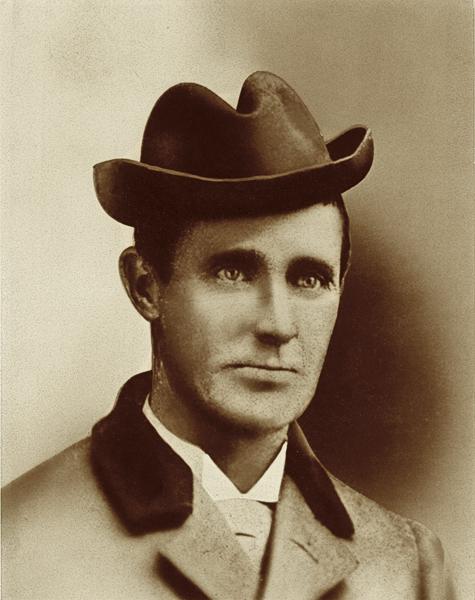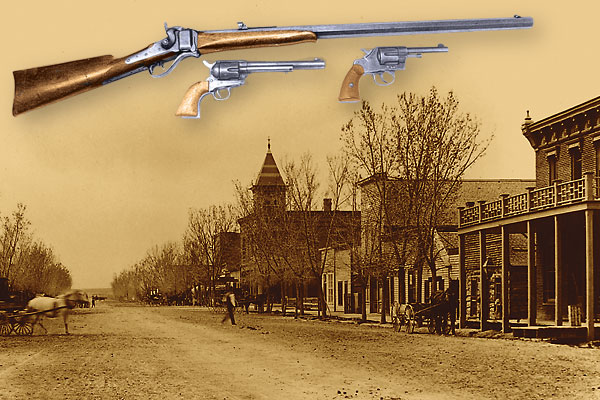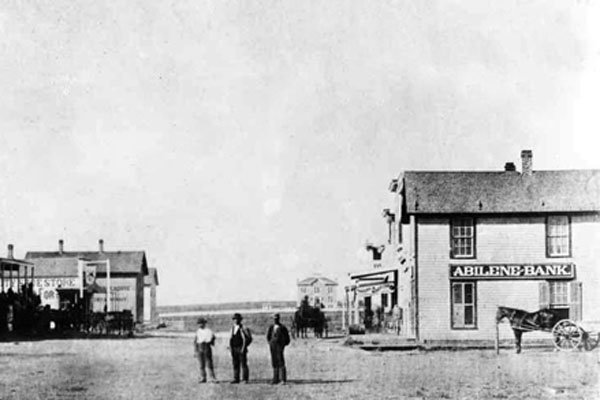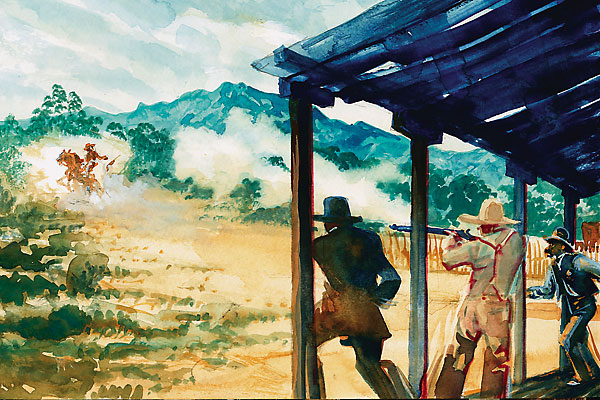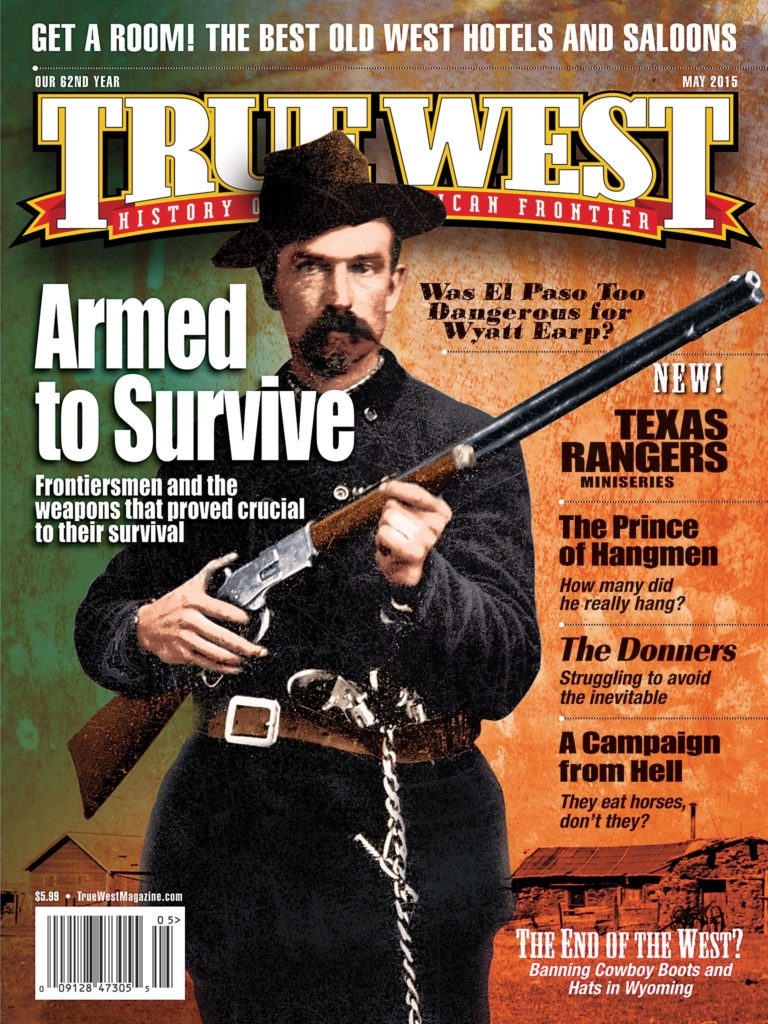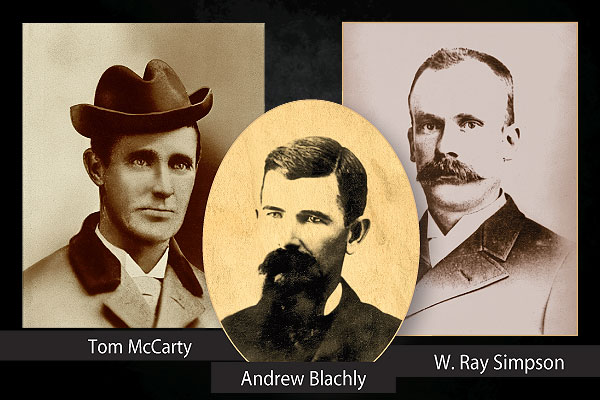 September 7, 1893
September 7, 1893
Not many folks are out and about on this stifling hot Thursday morning in Delta, Colorado.
At 10:15 a.m., fifteen minutes after the Farmers and Merchants Bank opened, Bill McCarty and son Fred are conducting business inside—with guns in hand.
Bill orders cashier Andrew Blachly and his assistant Harry Wolbert to raise their hands. Fred jumps up on the partition, aiming to get behind the counter and grab some cash. But Blachly, surprised, gives out a yelp and puts a hand under the counter. He may or may not be reaching for a gun.
He’s told to keep quiet, but Blachly yells again. He is trying to warn lawyer W.R. Robertson, who has an office in the rear of the bank. Blachly is guessing the gang will exit through there when they leave (he is right).
Fred, noticeably uptight, fires twice at Blachly, at point-blank range. The first shot misses; the other hits Blachly in the head, killing him instantly. Fred jumps down, shoves a handful of currency into a sack under his shirt and grabs a bag of coins.
Robertson, who has heard the two gunshots, runs outside through the exit door in his office and meets Tom McCarty—Bill’s brother and Fred’s uncle—who is holding the horses there in the alley. Tom puts a gun on the lawyer.
Tom also quickly ties the other two horses to the corner post of a coal bin, as the gunshots have indicated to him that his partners will need to make a quick escape. Once Tom sees the other two robbers exit the back door, he mounts his horse and rides off.
The robbers don’t much care about the unarmed hostage, as they just want to get out of town alive, hopefully with their loot. When Fred mounts his horse, though, he drops the coin bag. With nearly $700 in cash still on hand, the McCartys leave the coins and ride hell for leather north in the alley.
Hardware merchant W. Ray Simpson hears the commotion from across the street and runs outside with his Sharps rifle in hand. As he crosses Main Street, he sees the robbers about a block away, where the alley crosses Third Street.
Simpson aims at the last man and fires. The bullet blows the top of Bill’s head off; his body stays in the saddle for a few seconds before dropping lifeless in the dust.
Simpson reloads his single-shot rifle as he runs to Bill’s corpse. Fred is just a few feet from freedom, but he has wheeled his horse around, where the alley ends at Second Street, to assist his father, who he thinks is wounded, not dead. Seeing Simpson, Fred takes three shots at him.
Simpson takes aim at Fred. His second shot of the day—estimated at more than 100 yards—hits the youngster in the head; Fred is dead before he hits the ground.
Tom is luckier. He was ahead of Fred, yelling at him to “come on,” when his nephew is killed. Tom spurs his horse just as Simpson takes a bead on him. This time, the sharpshooter misses his man and hits the horse in the hind foot. The outlaw urges his horse on and gets out of town.
The gang’s gallop down the alley is littered by the cash they have dropped along the way.
This fruitless robbery is the end of the McCarty Gang.
The Road to the Delta Debacle
Tom McCarty and younger brother Bill have been on the wrong path since the early 1870s. They have graduated from rustling cattle to holding up banks. Both have spent brief periods behind bars.
In 1893, Tom, 43, and Bill, 41, are on the lam after robbing a bank in Roslyn, Washington, the previous September (with the help of Tom’s brother-in-law Matt Warner, brother George McCarty and Bill’s 20-year-old son Fred). Traveling through western Colorado, they are low on money. A heist seems in order.
They settle on the farming community of Delta, which has two banks. For an unknown reason, they choose the Farmers and Merchants Bank. Perhaps they also plan to rob the second bank, but history does not record that for sure.
On August 20, Tom, Bill and Fred set up camp 10 miles west of Delta. Leading up to the day of the robbery, they visit the town, scout the bank, look over various escape routes and gather local gossip.
On Wednesday, September 6, Bill and Fred rent a room at the Central House Hotel under aliases. The next morning, they meet up with Tom at Steve Bailey’s Palace Sampling Room Saloon, located on Main Street, across from the bank. Some witnesses later say the men left drunk.
Around 10 a.m., with the bank finally open for business, a nervous Fred says it is time to go. Bill and Fred walk across the street to the bank. Tom rides his horse and leads the other two horses to the rear of the bank building.
A Family Affair
The McCartys are more than just a cattle ranching family in Oregon. They have made bank robbery a family affair. Brothers Tom, Bill and George are joined by Bill’s son, Fred, George’s wife, Nellie, and Tom’s brother-in-law Matt Warner.
The family’s first heist takes place in 1891, at the Wallowa National Bank, in the remote Powder River Valley. Just like Wyoming, Colorado and Utah’s wild environs allow outlaws to escape their crimes unnoticed, Oregon offers the perfect country for the McCarty Gang to form its outlaw empire.
In 1891 or 1892, Tom McCarty makes a trip with Matt Warner to visit an old friend of theirs, Butch Cassidy. They knew him when he was 23-year-old Robert Leroy Parker, who helped them pull off a bank robbery in Telluride, Colorado, on June 24, 1889. The two invite him to join their gang, but he is not interested.
Using the money he has made from his Colorado robberies, Tom purchases land so he can have a string of hideouts for the heists. The family goes on a successful robbery spree, unrecognized.
But one family member will turn on all of them—not from the McCarty side, but from the Warner side. Matt’s lonely wife, Rose, has brought her sister, Sarah Jane, from Utah to the Warner’s 7U Ranch in Washington. But Sarah Jane does not approve of Matt’s outlawry, so she tells the authorities in Salt Lake City, Utah, all about the McCarty Gang.
That’s how Matt Warner and George McCarty find themselves in jail in Ellensburg, Washington, in April 1893.
But the law has not been able to find Bill, Fred and Tom McCarty. With the authorities hot on their trail in Oregon, the three move on to their Colorado haunts…and make their way to Delta.
The Fourth Robber
Tom McCarty escapes, thanks to some extra horses he left outside Delta. The McCarty Gang has never robbed a bank without having one or two gang members holding the relay horses at their camp or another designated place.
This is why James K. Wetzel believes at least one additional gang member was at that camp. Wetzel, the director of the Delta County Historical Society Museum since 1998, is the author of Banks, Bullets and Bodies: A Failed Robbery in Delta, Colorado. Since the robbers had eight horses, plus a pack mule, Wetzel believes each of the four robbers had a main horse and a getaway horse.
Who does he think the fourth robber could have been? Tom’s son, Eck.
Aftermath: Odds & Ends
Of the $700 stolen from the Farmers and Merchants Bank, about $294.86 was lost to the robbers. The townsfolk recovered the rest of the money.
***
Andrew Blachly, the murdered cashier, left behind a wife and their eight sons, ranging in age from one to 15. His brothers helped the widow Blachly by financing college for seven of them; three of them went on to earn advanced degrees.
***
By 1900, Tom McCarty had returned home, to northeastern Oregon, where he worked a variety of jobs, including county road supervisor, justice of the peace and elections official. In 1917, he dropped off the map. His Oregon friends and acquaintances heard nothing more from him.
***
Bill and Fred McCarty’s bodies were laid out and photographed (pictures sold for 25 cents a piece). The bodies were buried, supposedly in one box, in the Delta Cemetery’s Potter’s Field section. A memorial stone was placed at the grave site in 2001.
***
Across the country, newspapers celebrated W. Ray Simpson, the hero of Delta. But not long after the robbery, he started receiving threatening letters—from Tom McCarty. He escaped his tormentor by moving to Battle Creek, Michigan, in 1899, where he managed the sanitarium’s health food company, which developed Grape-Nuts, corn flakes and other Post cereals. After his wife, Mary, died as a result of surgery, Simpson relocated to southern California, where he founded two hospitals. He died aged 78, in 1940.
Recommended: Banks, Bullets and Bodies: A Failed Robbery in Delta, Colorado, by James K. Wetzel, published by Delta County Historical Society Museum.
Photo Gallery
– Illustration by Bob Boze Bell –
– Courtesy Salt Lake City Police Dept. –


